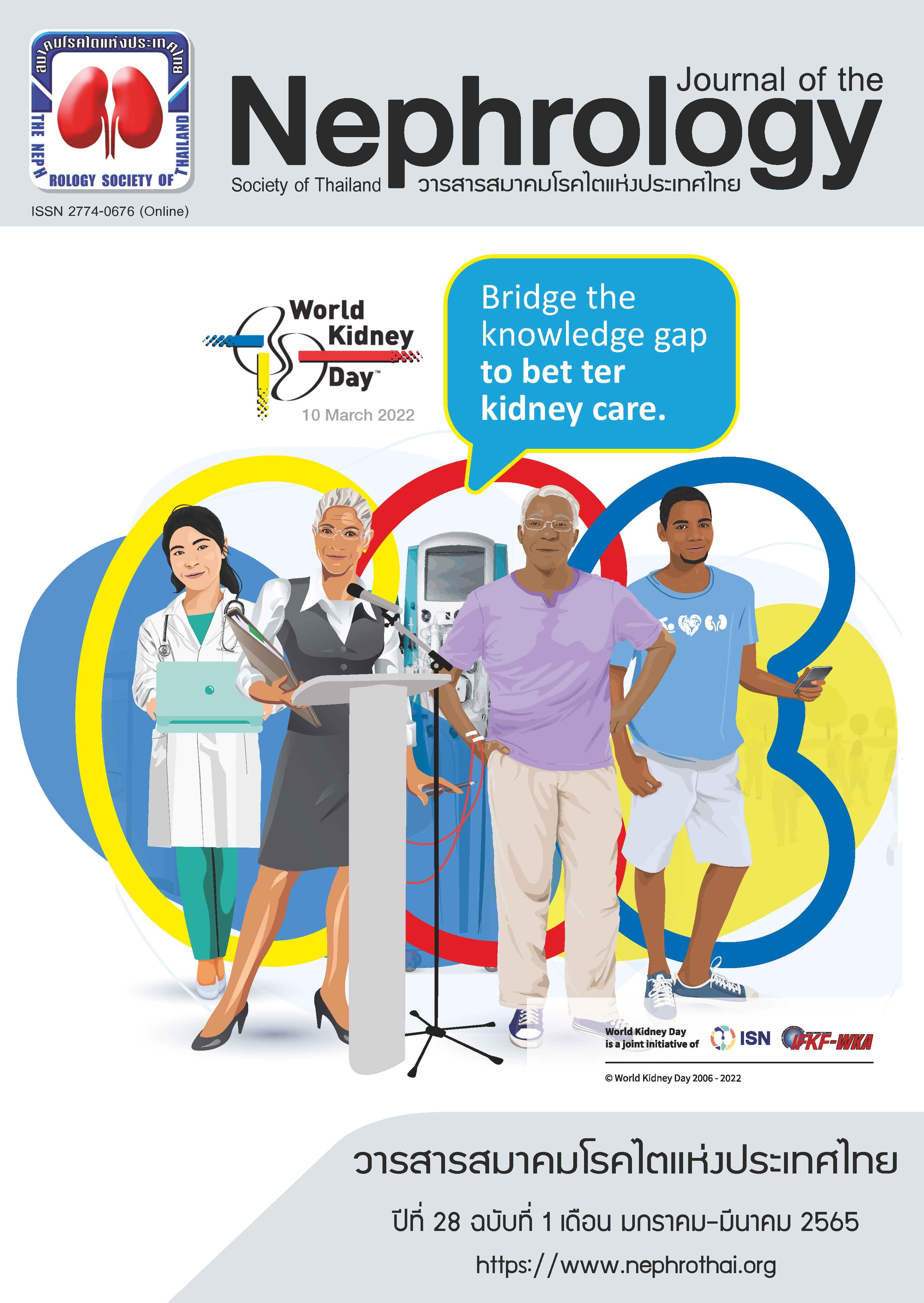Survival outcome after decision making for renal replacement therapy in chronic renal failure
Main Article Content
Abstract
Background: Renal replacement therapy (RRT) counseling is an important process in the treatment plan for patients with chronic kidney disease (CKD). Changing decisions of patients will affect the care of physicians and may increase morbidity. We faced treatment challenges due to patient indecisiveness or changing their decisions and sometimes failed to save their lives.
Methods: Data of patients with CKD, receiving RRT counseling in the dialysis unit from 1 October 2015 to 31 March 2020 were recorded until 31 March 2021 used for and analyzed.
Results: Altogether, 602 eligible cases were selected for the study comprising 12.12% stage 4 of CKD, average age 60.80+14.05 years, 48.0% males and mean Charlson Comorbidity Index (CCI) scores of 5.45+1.83. Diabetes was the major underlying disease. After counseling, more than one half of patients with CKD stage 4 were indecisive and 76.75% of patients with stage 5 rejected RRT. Patients who changed their decision totaled 6.37% and mostly in stage 5. In all, 51.66% (311 cases) received dialysis of which 46.6% included hemodialysis. Death presented in 43.85% (264 cases) of all cases for which 33.71% (89 cases) comprised dialysis patients. In both stages of CKD (4 and 5), we found no difference in age, sex, underlying disease, mortality or types of decision, but those informed of RRT in CKD stage 5 accepted more dialysis treatment than those with stage 4 and lower eGFR at onset of dialysis (55.0% vs. 27.4%, P<0.001 and 4.87+2.36 vs. 6.01+2.81 mL/min/1.73 m2, P=0.040 respectively). In stage 4, patients with RRT acceptance received more dialysis treatment and started treatment earlier than those that rejected but without difference in CCI score, mode of dialysis, death or sex. Mortality rate in stage 4 was high among nondialysis patients [83.3% (15 case) and 16.7% (3 cases), P=0.015]. Exactly 76.7% (406 patients) of patients with stage 5 who rejected dialysis were older and experienced higher events in changing decision, death and dialysis treatment than those that accepted (62.22+13.37 yrs vs. 55.55+14.19 yrs, P<0.001, 47.8% vs. 4.9%, P<0.001, 48.5% vs. 31.7%, P<0.001 and 46.3% vs. 35.4%, P<0.001, respectively) but without difference in CCI score, eGFR in dialysis initiation and dialysis methods.
Conclusion: Decision making after RRT counseling affected patient mortality. Patients who accepted experienced more survival than who refused.
Article Details

This work is licensed under a Creative Commons Attribution-NonCommercial-NoDerivatives 4.0 International License.
This article is published under CC BY-NC-ND 4.0 license, which allows for non-commercial reuse of the published paper as long as the published paper is fully attributed. Anyone can share (copy and redistribute) the material in any medium or format without having to ask permission from the author or the Nephrology Society of Thailand.
References
Davison SN, Levin A, Moss AH, Jha V, Brown EA, Brennan F, et al. Executive summary of the KDIGO controversies conference on supportive care in chronic kidney disease: developing a roadmap to improving quality care. Kidney Int. 2015; 88(3):447-59.
KDIGO 2012 clinical practice guideline for the evaluation and management of chronic kidney disease. Kidney Int. Supplement. 2013; 3(1).
Austin G Stack. Impact of timing of nephrology referral and pre-ESRD care on mortality risk among new ESRD patients in the United States. Am J Kidney Dis. 2003;41(2):310-8.
B Klang 1, H Björvell, N Clyne. Predialysis education helps patients choose dialysis modality and increases disease-specific knowledge. J AdvNurs.1999; 29(4):869-76.
Bayliss EA, Bhardwaja B, Ross C, Beck A, Lanese DM. Multidisciplinary team care may slow the rate of decline in renal function. Clin J Am Soc Nephrol.2011; 6(4):704-10.
Stephanie Thompson, Matthew James, Natasha Wiebe, et al. Cause of death in patients with reduced kidney function. J Am Soc Nephrol. 2015; 26(10):2504–11.
Anne-Cécile Rouveure, Marc Bonnefoy, Maurice Laville. Conservative treatment, hemodialysis or peritoneal dialysis for elderly patients: The choice of treatment does not influence the survival. Nephrol Ther. 2016; 12(1):32-7.
Deidra C Crews, Julia J Scialla, L Ebony Boulware, et al. Comparative effectiveness of early versus conventional timing of dialysis initiation in advanced CKD. Am J Kidney Dis. 2014; 63 (5): 806-15.
Hemmelgarn BR, Manns BJ, Quan H, Ghali WA: Adapting the charlson comorbidity index for use in patients with ESRD. Am J Kidney Dis 2003; 42:125–32.
Charlson ME, Pompei P, Ales KL, Mac Kenzie CR. A new method of classifying prognostic comorbidity in longitudinal studies: development and validation. J Chronic Dis 1987; 40(5): 373-83.
Chen NH, Lin YP, Liang SY, Tung HH, Tsay SL, Wang TJ. Conflict when making decisions about dialysis modality. J Clin Nurs. 2018; 27(1-2):e138-e146.
Levinsky NG. The organization of medical care. Lessons from the Medicare end stage renal disease program. N Engl J Med. 1993;329(19):1395.
Klahr S. Rationing of health care and the end-stage renal disease program. Am J Kidney Dis. 1990; 16(4):392.
Murray MA, Brunier G, Chung JO, Craig LA, Mills C, Thomas A, et al. A systematic review of factors influencing decision-making in adults living with chronic kidney disease. Patient Educ Couns. 2009; 76(2):149-58.
Brown MA, Collett GK, Josland EA, Foote C, Li Q,Brennan FP.CKD in elderly patients managed without dialysis: survival, symptoms, and quality of life. Clin J Am Soc Nephrol. 2015; 10(2):260.
Koch M, Kohnle M, Trapp R, Haastert B, Rump LC, Aker S. Comparable outcome of acute unplanned peritoneal dialysis and haemodialysis. Nephrol Dial Transplant. 2012; 27(1):375-80.


